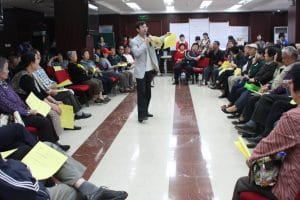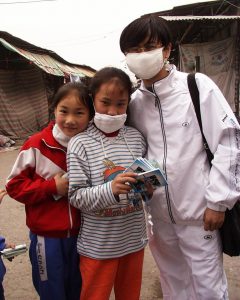The number of rural migrant workers in China reached 280 million in 2020, according to Reuters, representing almost 20 percent of the total Chinese population. During the pandemic, they were possibly the hardest-hit group – due to both external factors, such as a lack of social insurance and poor support from companies and communities, and internal factors, including difficult family situations, a lack of skills and negative social identity.
The huge flow of migrant workers from rural to urban areas of China is not a new phenomenon, and worldwide urbanization and the movement of labor has brought a large proportion of people from the countryside into urban areas, leading to both economic prosperity and social issues. Challenges posed by urbanization and migrant workers have attracted attention from academics and the media, but real solutions are yet to be found.
While national policies and global mutual efforts are vital, support from charitable organizations to migrant workers is also making a difference. Early this year, CDB spoke to Li Tao, founder of the Beijing Social Work Development Center for Facilitators (“the Facilitators”) which is dedicated to the needs of migrant workers.
The Facilitators was founded in 2003 in the midst of the SARS outbreak. The initial task of the charity was to offer support to migrant workers in Beijing who were in need. For Li Tao, the birth of the organization was not a new beginning, rather, it was a continuation of what he had been dedicating himself to for years.
Having worked as a journalist at the China Women Newspaper, as well as living in the countryside for a couple of years, Li believes he has an emotional bond with migrant workers.
“I interviewed a large number of migrant workers when I was working for the China Women Newspaper. I grew to respect them after hearing their stories because in many ways migrant workers have sacrificed a lot to facilitate the convenient lives we lead in the cities,” he said.
Indeed, before the reform and opening up policy, China’s workforce was not especially mobile. But since the late 1970s, the country has witnessed a huge flow of labor from villages to cities, from northern China to southern China, and from inland regions to coastal areas.
“There were many obstacles to the flow of labor at that time, and migrant workers were the first group of people who met those obstacles. They either adjusted themselves to the new environment, rules and culture, or they struggled – and sometimes failed. But through their personal struggles, problems could be exposed and solutions could be identified. And this is still the case today,” said Li, who thinks the free movement of labor has become one of the defining issues of modern China.
Thus, for him, what migrant workers have experienced over the past few decades has since become the norm for the younger generation. Hence, it is critical to pay attention to how migrant workers are treated by policies, society and other citizens — for it will undoubtedly impact the future labor force as well.
“I reckon the movement of labor is fundamental to human societies. Throughout history, humans are constantly ‘moving’ to look for better places to live and develop. But once they move to a new environment, they cannot live decently without support from the local authorities and community.”
The first group of Li’s interviewees were all female migrant workers, most of whom had only received limited education before saying goodbye to their hometowns. Their stories and experiences in the city struck him deeply and he was eager to do something for them. In 1996, Li and his friends hired a room for the workers and gave them classes to help them catch up on some of the education they had missed out on. As Li got to know the workers better, he started to realize something: the education they were receiving from him and his friends could improve their knowledge, but it couldn’t change their situation or how they perceived themselves.

“For the first time, I started to doubt if education could really change a person’s destiny,” said Li.
While education might help a migrant to read all the words in a book, it wouldn’t change the reality of demanding employers, low salaries, bad working and living conditions, and the need to send money back home to support struggling families – not to mention the challenges of living in an alien city. Li repeatedly asked himself how much time a migrant worker could really have for themselves and whether there was anything they could possibly read that would change their lives.
“Is there a subject which enables people to become self-aware and helps them appropriately manage the relationships they have with the people around them? And can it help them to address personal problems and care for bigger, wider issues all related to social justice?”
Li found his answer after two years of searching. In 1998, China Women’s University reached out to him and invited him to take the position of social work supervisor. Without realizing what he had been doing was partially related to the subject of social work, Li hastily looked for textbooks and read up on the relevant concepts, principles and cases. It quickly became clear to him that social work was the answer he had always been looking for.
“What impressed me the most were the theory of empowerment and the strengths perspective; these help the service recipients solve their problems, which are mostly caused by social inequality, through exploring individuals’ abilities and facilitating them to gain the power to improve their lives,” said Li.
In the 1990s, most migrant workers came to big cities on their own. It was sensible to think that once they had made some money, they would return home. However, to people’s surprise, as the new millennium approached it became clear that after returning home, many would later come back, but this time with their family.
Migrants now had to worry about more than employment. Childcare, education, and healthcare, were just some of the new concerns for migrants already leading difficult lives. Two decades ago, support from policies and society was not always available to these city newcomers, and it was against this background that the Facilitators was founded.

At present, the organization directly provides three types of services to migrant workers: aid, family support and community engagement.
“Aid is given in two scenarios. First, when the rights of migrant workers are violated by employers, such as in the case of delayed wages or work-related injuries, we will intervene and help defend workers’ rights. Additionally, aid will be provided when migrant workers are in need, for example, if they suddenly get ill or are made redundant and that causes their family to fall into poverty. Our family support services target migrant workers who move to cities with children. We introduce the families to their new communities and encourage them to meet other people living in the same community and to help each other in times of need. We also provide childcare services for working parents, and, going further than ordinary providers, our services for children include an after-school curriculum, camps, volunteer and community activities, and workshops for both parents and children on childbearing and family relations. Through these activities, we aim to encourage each child to behave like a responsible citizen from an early age. In addition to individuals and households, we are equally focused on the community. We regularly arrange community events and invite all the members to join. This has created opportunities for both long-term residents and newcomers to get to know each other.”
Applying direct intervention to help migrant workers is important, but it is not enough. Li believes that in order to make a difference to people’s lives, the social environment and labor market as well as relevant policies need to be changed. That is why the Facilitators are also engaged in policy advocacy.
“Our team has run more than 30 research programs on migrant workers. Our research contains a great amount of information gained through interviews we’ve conducted; we want their voices to be heard when we present our findings to policymakers.”
Advocacy has also been carried out among urban residents, Li told CDB. “We want people in the city to look at the migrant workers as fellow citizens and get to know them personally: who they are, what their personalities are like and what they are passionate about.”

The Facilitators have arranged performances and exhibitions that are open to the public and helped publish stories and poems written by migrant workers.
“Through these events, we hope the city residents and migrant workers can start their own conversations through which understandings can be arrived at and connections can be built. That is where a more inclusive and diverse environment can begin to emerge.”



